History
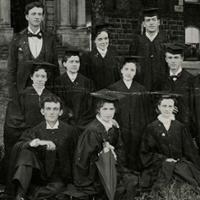
Teacher Education — Students in what then was called the Normal Department made up nearly 40 percent of the university’s enrollment during its first six years.
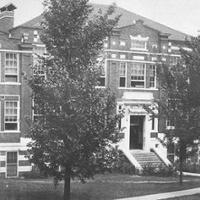
Peabody Hall — The building in the 1940s looks remarkably similar to the building today. The restoration project in 2011 removed layers of white paint, some of which had been on the building for more than 60 years.
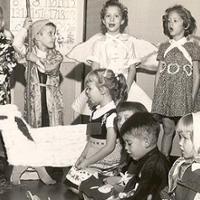
Training School — Children attending the elementary school in Peabody Hall dress in international costumes for a school event in 1960.
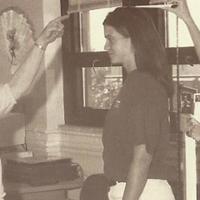
Health Education — The college changed its name from College of Education to College of Education and Health Professions in 1997 to more accurately reflect the broad array and full diversity of its academic and professional programs.
College Marks Milestones
Teacher education has been integral to the University of Arkansas since its founding in 1871. It began in what was called the Normal Department, a phrase included in the legislation creating the university. The term “normal” was used commonly in the 19th century to refer to the imparting of norms of exemplary teaching, and so to pedagogical training or to an institution devoted to teacher preparation.
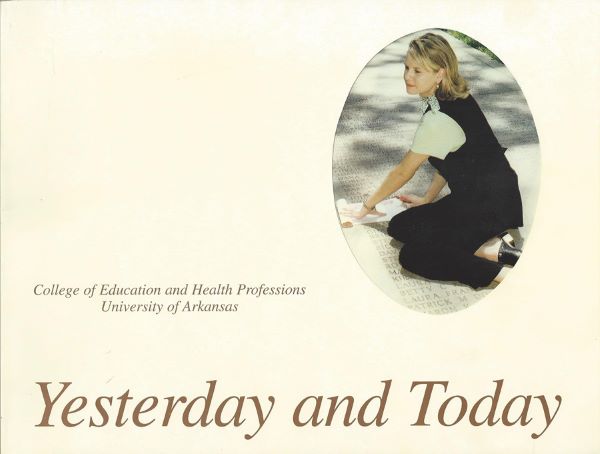 This was according to a history called Yesterday and Today that Christopher J. Lucas, a professor of higher education, published in 1998 about
the College of Education and Health Professions at the U of A.
This was according to a history called Yesterday and Today that Christopher J. Lucas, a professor of higher education, published in 1998 about
the College of Education and Health Professions at the U of A.
“The normal feature of the university will be the first to bear fruit,” predicted Trustee Albert W. Bishop in the 1872 commencement address. “With experienced teachers secured, the material to work upon here, and the necessary appliances for instruction obtained, the friends of this institution are very much encouraged by what they see has already been accomplished.”
He believed the state’s emerging public school system had begun to create a “new order of things in society” and the urgent need now was for an armory in which to forge classroom teachers, Lucas wrote.
Ten normal students graduated with teaching diplomas in 1875, the first class for which commencement exercises were held in the university’s new building, later known as Old Main.
The Bachelor of Science in Education was authorized in 1914.
In 1917, the U of A Board of Trustees approved a request by faculty to create a college of education from what was then a school of education. The first four-year degrees were awarded to five students in 1916, the same year the Master of Science in Education was established.
Another important part of the college’s history was the training school in Peabody Hall that offered both an education to children of the area and an opportunity for practice teaching for the college’s education students. J. William Fulbright was the most famous student enrolled in the training school. He went on to become president of the university and a U.S. senator who established the Fulbright international exchange program. Fulbright attended school in Peabody Hall from kindergarten through 12th grade. University High School closed in 1961 because of cost and a shortage of space. The elementary school closed in 1966, but the college continued to operate a kindergarten until the 1980s.
Originally constructed in 1913, Peabody Hall was restored and dedicated in 2011, earning it an award from the Historic Preservation Alliance of Arkansas. Lucas wrote a separate history of the training school, Demonstrating Good Practices: A Brief Historical Profile of the University Training School and its Predecessors.
Degrees in the health-related fields were added to the college over the years. In the 1940s, the college was reorganized into three divisions: Vocational Teacher Education; Health, Physical Education and Recreation; and General Education.
The college celebrated several anniversaries in 2022. Twenty-five years earlier, its name was changed from the College of Education to the College of Education and Health Professions to better reflect the diversity of programs offered. It was also the 25th year since the Master of Arts in Teaching graduated its first students and the Eleanor Mann School of Nursing was dedicated. The nursing school had been added to the college as a department 10 years earlier, in 1987.
Past Deans
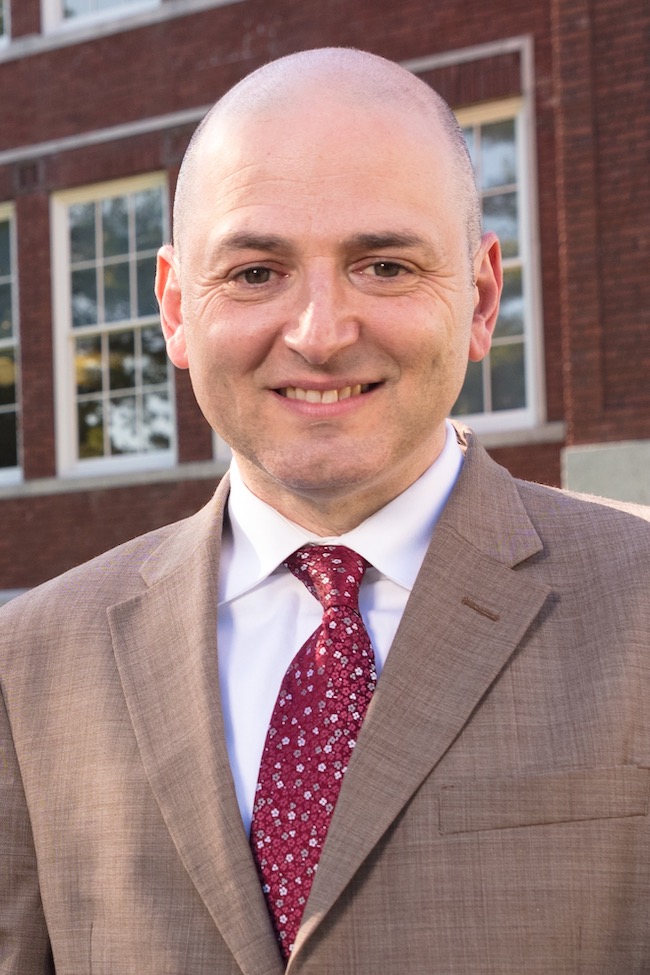
Brian A. Primack, M.D., Ph.D., served as dean from July 2019 through June 2022. He held the Henry Hotz Endowed Chair as dean along with being a tenured professor of Public Health and had a secondary appointment with the University of Arkansas for Medical Sciences College of Medicine as professor in the Department of Internal Medicine, Division of Community Health. Before coming to Fayetteville, Primack was dean of the Honors College at the University of Pittsburgh. Following Fayetteville, he moved to Oregon State University to serve as dean of its College of Health.
Primack's service coincided with the years of the Covid-19 pandemic. He responded both in adapting the training of educators and healthcare professionals as well as service to the state of Arkansas. Among several projects, he led a group of faculty to create the COEHP Remote Teaching Collaborative website to enhance online (remote) teaching with sharing of both technique and tech issues. Separately, teaching faculty compiled a curated (updated periodically) list of resources for parents of young children during the time of school closures, including art lessons, playful learning activities and virtual experiences. With the pandemic came a worldwide increase in the use of social media, a research topic for Primack beginning at Pitt and continuing at the U of A, examining its relation to depression in young people, about which he wrote and lectured.
“I'm very proud of what we have accomplished together. The pandemic had been difficult for all of us, but we rose to the challenge and truly made a difference in the lives of our students, the community and each other,” Primack said. “I'm proud that our college lived up to the moniker of 'the home of the caring professions.'"
With Primack's leadership, enrollment in the college increased by nearly 14 percent during his three years, and annual sponsored research awards rose by almost 7 percent.
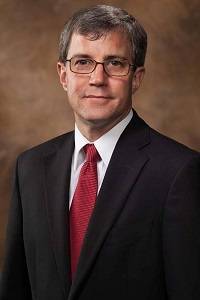
Michael T. Miller served as dean from July 2016 through June 2019. He previously had served as head of the Department of Educational Leadership, Counseling and Foundations (now Department of Counseling, Leadership and Research Methods), associate dean for Academic Affairs, and as the college’s first senior associate dean. Upon completion of his term as dean, he returned to his faculty role as a Professor of Higher Education and as the interdisciplinary Ph.D. in Public Policy area coordinator of Higher Education Policy.
He is particularly proud of his work in the area of student success, and during his time as dean he created an office of undergraduate advising and student success, making use of full-time, professional advisors. He is also very proud of his work to raise the funds to successfully complete the college’s portion of the Campaign for Arkansas and the creation of a parallel degree program in Educational Studies as an alternative to formal teacher training.
“I really enjoyed many aspects of serving the college as dean,” Miller said. “In particular, I was constantly amazed at the quality of our faculty, their commitment to their disciplines and student success.” When asked about what he enjoyed most, he echoed the sentiments of his predecessor deans Smith and Greenwood. “Commencement is such a wonderful experience for our students and their families” he said. He continued, “I would also add that I always enjoyed our Scholarship Recipients and Benefactors program. We would have a luncheon where benefactors who endowed scholarships would sit down for a meal with the student who was awarded that scholarship. Great memories!”
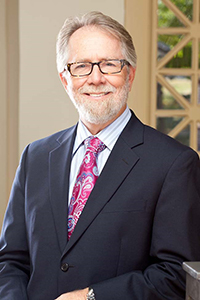
Tom Smith served as dean from July 2009 to June 2016. He returned to the faculty of the special education program and led the development of EMPOWER, a non-degree, four-year college experience program for students with intellectual disabilities.
He described his greatest accomplishment as helping to continue the change in culture that was begun by then-Dean Reed Greenwood from a traditional college that prepared professionals to one that places research at a higher level. This led to better national rankings that helped change the reputation of the college, on campus, in the state and nationally.
The way we made progress in this area was to recruit some excellent young faculty. They are the ones, working with our more senior faculty, who helped make the change, Smith said.
He also mentioned being dean when the college received the largest research grant ever, $35.7 million to establish Arkansas PROMISE. The program is a federally funded research project assisting teenagers who receive Social Security disability benefits. Again, it was our faculty and staff who made this happen, Smith said.
As state financial support continued to decline, every college and all faculty and staff were asked to do more, he said, one of the greatest challenges during his tenure.
We had to improvise ways to increase our revenue outside traditional funding, Smith said. The facultys willingness to engage in web-based programs was very important.
His fondest memory of serving as dean was commencement, the best day of every year, seeing students graduate and seeing their family and friends celebrate and knowing that our college was important in those successes.
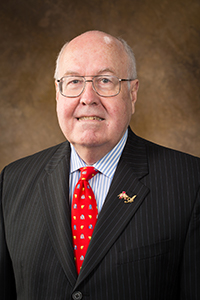
Reed Greenwood served as dean from July 2001 to June 2009. He then joined the faculty of the Department of Education Reform before he retired from the university in 2014.
He described increases in student enrollment supported in part by new scholarships as one of the greatest accomplishments during his tenure. Another was the addition of new faculty supported by new program funding and new endowed professorships and chairs.
At the same time, securing program funding and support for new and retained faculty and to add needed student scholarships proved to be one of the biggest challenges Greenwood experienced as dean.
One of this fondest memories was seeing students graduate, and he also enjoyed seeing faculty and staff members succeed in their jobs and goals.
Two people in particular, associate deans John Murry and Barbara Hinton, had a significant impact on Greenwood.
"They are both exceptional professionals who guided their respective areas to high levels of achievement," he said.
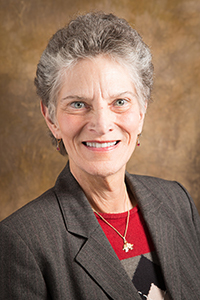
Sharon Hunt served as dean in the 2000-01 academic year. She is retired from the kinesiology program faculty. For several years she was the university’s faculty athletics representative to the Southeastern Conference. Also, Hunt served multiple terms on the Arkansas Alumni Association’s National Board of Directors.
Her greatest accomplishment during her time as dean was to meet the college’s fundraising goal set in the silent phase of the capital campaign called the Campaign for the Twenty-First Century. The college’s development officer had recently resigned.
The greatest challenge was organizing personnel and moving forward after the resignation of two associate deans, Hunt said.
"Also, there were insufficient resources to do for faculty and staff what you’d like to do for them," she said.
She also found promotion and tenure decisions excruciatingly difficult.
Hunt recalled her fondest memory as attending the American Association of Colleges of Teacher Education convention in New Orleans when the college received an award as the outstanding teacher education program, beating Texas A&M.
"I was able to speak about the program, noting its particular strengths, which hopefully helped our college win the national award," she said.
She felt blessed to have the complete support of faculty and staff in the college and the university.
"I always felt supported by the entire faculty and staff of the College of Education and Health Professions," Hunt said. "Everyone was absolutely wonderful to me. The other deans who served with me on the council of deans were incredibly helpful to me."
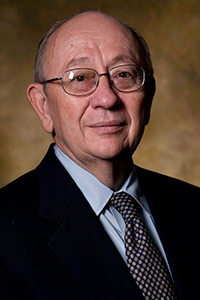
Charles Stegman served as dean in the years 1995 to 2000. Stegman continues to teach in the college as a professor of educational statistics and research methods.
According to Chris Lucas’ history of the college, Stegman’s arrival promised renewed emphasis on research and scholarly productivity, regional and national outreach, and a broad gamut of service involvement by the college. He highlighted the close reciprocal relationship between theory and professional practice.
During his tenure in the office, the college graduated its first class of undergraduates from the baccalaureate nursing program. The year following, with a $1 million endowment, the Eleanor Mann School of Nursing was dedicated.
The new name of the college became effective while Stegman was dean, and the college also graduated its first students from the five-year Master of Arts in Teaching program. Both were in 1997.
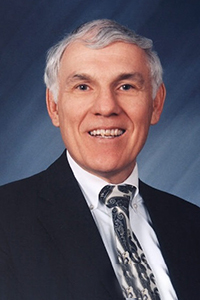
Mel Fratzke served as dean from July 1994 through October 1995, a 15-month period that was packed with action. He is retired now.
"It was a major year because we went through national teacher accreditation," Fratzke said about the successful review by the National Council for Accreditation of Teacher Education. "It was a big deal and required a lot of preparation. We got a good report."
The second accomplishment during that time was the further implementation of the Master of Arts in Teaching program, working out the details of how it would operate in local schools. Thirdly, Fratzke recalled all the committee work and planning that went into changing the name of the college, which was official in 1997.
His greatest challenge was not having enough time to do all the things he needed to do.
He remembers fondly that changing the name of the college was particularly significant for the faculty in nursing and other health-related programs.
Annette Digby and Mike Wavering were instrumental in implementing the MAT in schools, Fratzke recalled, and Margaret Sullivan, chair of nursing at the time, had a very calming influence on that program at a time when it first received National League for Nursing accreditation.
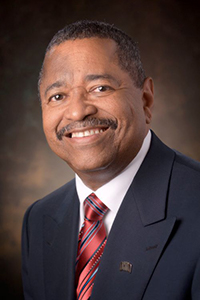
Rod McDavis served as dean from July 1989 to June 1994 and was the first African-American dean in the history of the university. He went on to become president of Ohio University and is now managing principal of AGB Search in Washington.
His greatest accomplishment as dean was overseeing the development and implementation of the Master of Arts in Teaching program and helping to create the Arkansas Leadership Academy.
His greatest challenges were developing a unified strategic plan for the college, raising enough private money to provide funds for scholarships and support for academic programs and increasing research funding.
McDavis said he enjoyed working with the wonderful students and great faculty and staff who were in the college.
"There were many faculty and staff members who were very influential during his time as dean", McDavis said.
"Sandra Bowman, Mel Fratzke, Naccaman Williams, Sam Totten, Jon Pedersen and Sharon Hunt were a few of the people who had a significant impact on me while I served as dean", he said.
Information about other deans can be found in the Lucas history Yesterday and Today.
- William Klingele, 1986-89
- John Pulliam, 1985-86
- Jack Williamson, 1984-85
- Fred Vescolani, 1970-84
- Henry Kronenberg, 1945-70
- Henry Hotz, 1934-1945
- Charles Prall, 1929-34
- John Creager, 1927-29
- James Jewell, 1913-27
Professors and Staff Emeriti
Department of Communication Disorders and Occupational Therapy
- Fran Hagstrom
- Barbara Shadden
Department of Counseling, Leadership, and Research Methods
- Jules K. Beck
- Bobbie Biggs
- Sandra Bowman
- Daniel Cook
- Jack DeVore Jr.
- Roy L. English
- Roy Farley
- G. David Gearhart
- James Hammons, deceased
- Carleton Holt, deceased
- Deniece Honeycutt
- Barbara Hinton
- Lynn Koch
- Bobby Means
- Sean Mulvenon
- Rick Roessler, deceased
- Donald Rye, deceased
- Charles Stegman
Department of Curriculum and Instruction
- Freddie Bowles
- Margaret Clark
- Shirley Clark, deceased
- Theresa Cronan
- Beverly Elliott (mainly taught in the former Department of Educational Leadership, Counseling and Foundations)
- Linda Eilers
- Mounir Farah, deceased
- Barbara Gartin
- John "Jay" Graening, deceased
- Charlene Johnson
- Lavonne Kirkpatrick
- Mildred I. Manwarren, deceased
- Susan Riggs
- Tom Smith
- Emilie Sullivan
- Gary Taylor, deceased
- Samuel Totten
- Michael Wavering
Department of Education Reform
- Robert M. Costrell
- Reed Greenwood
- Sandra Stotsky
Department of Health, Human Performance and Recreation
- Barry Brown
- Ruth Cohoon
- Ro DiBrezzo
- Janet Forbess
- Inza Fort
- Mel Fratzke
- Dean Gorman
- Joyce Graening
- Jean Henry
- Sharon Lee Hunt
- Steve Langsner
- Susan Mayes
- Charles Riggs Jr., deceased
- R. (Robert) Rodney Ryan, deceased
- Betty Wallace
- Frances Wood, deceased
Eleanor Mann School of Nursing
- Kathleen Barta
- Betty Battenfield, deceased
- Nan Smith-Blair
- Evelyn Eldred
- Marianne Neighbors
- Susan Patton
- Wendy Sisson
- Margaret Sullivan